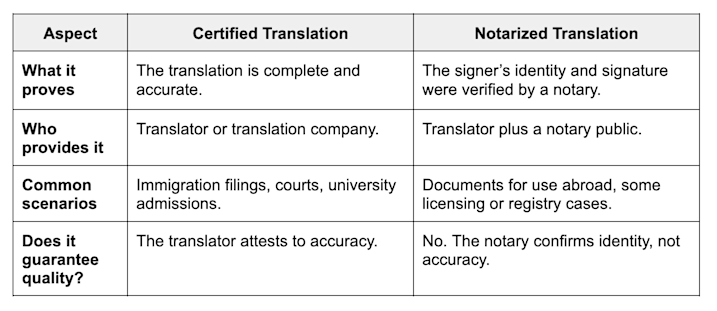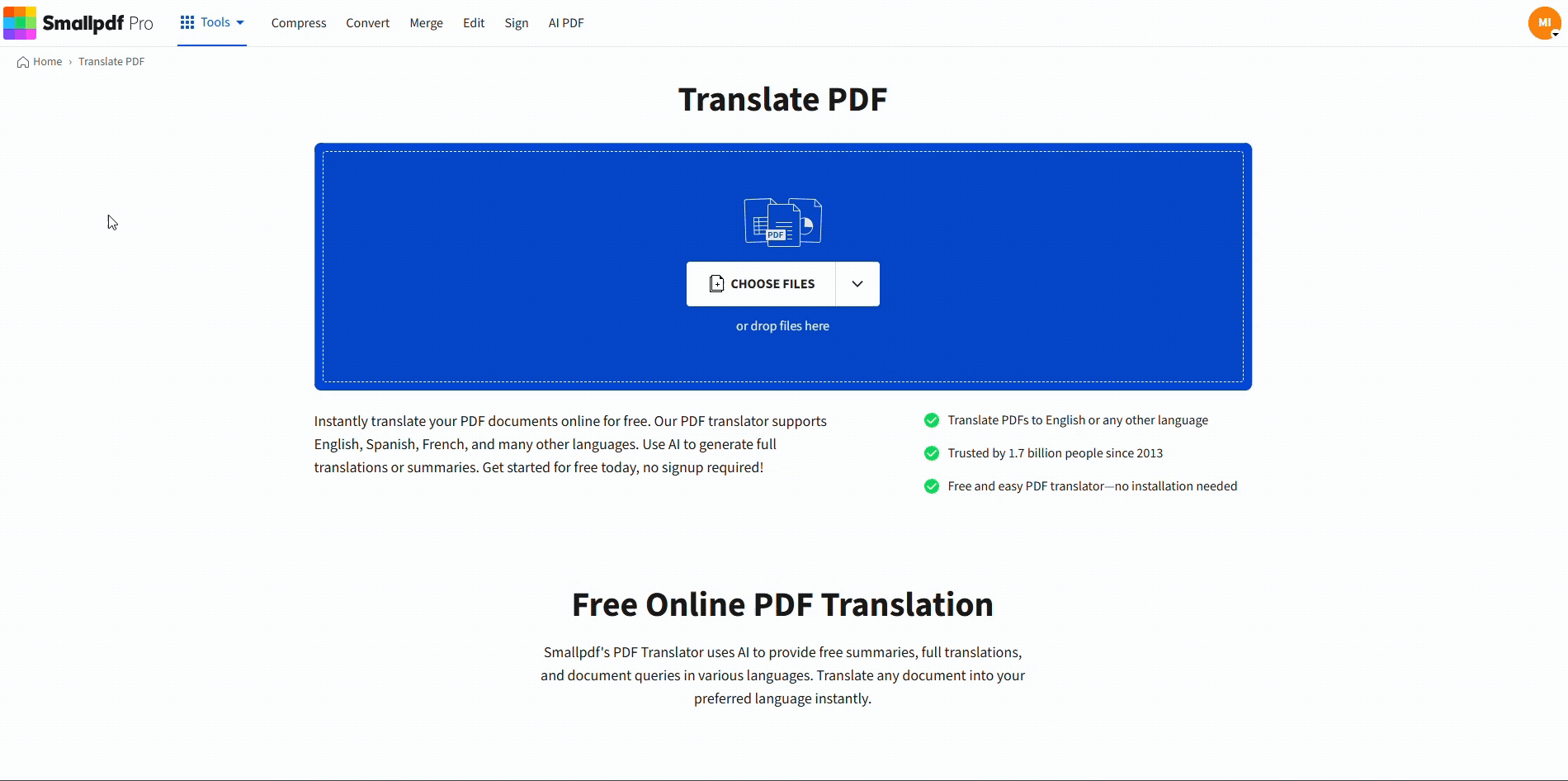Certified, notarized, sworn. These labels decide if your paperwork gets accepted. Here’s how to choose the right translation and stay on schedule.
Need a certified or notarized translation fast? We’ll help you pick the right option, avoid rejections, and prep your PDF for submission.
You’re ready to translate a document, then an office asks for a certified or notarized translation. Sometimes they even ask for a sworn translation. These translations sound similar, but they don’t mean the same thing.
Certified translations focus on accuracy. Notarized translations focus on identity. Sworn translations depend on the country and usually come from a translator officially authorized by a court or government.
Read on, and you’ll find out the differences between these translations.
How To Choose the Right Translation Type: Step-by-Step Guide
Step 1: Check Where the Document Will Be Used
Ask the receiving office what they accept, and ask them to name the format in writing. Requirements can change by country, agency, and even the specific local branch.
Step 2: Match the Request to the Right Proof
If they care about translation accuracy, you’ll usually need a certified translation. If they care about verifying who signed the certification, you may need notarization. If they require an official government-approved translator, you’ll need a sworn translation.
Step 3: Confirm any Extra Legalization Steps
Some destinations also require an apostille or legalization of the original document or supporting statements. This is separate from translation, but it often shows up in the same checklist.
Step 4: Prep Your File so It’s Easy To Accept and Process
Clean scans, readable text, and consistent formatting reduce delays. If your file is a PDF, Smallpdf Translate PDF can help you create a clear working version before you move into certification or notarization.

Certified vs. notarized translation comparison table
What Is a Certified Translation?
A certified translation is a full translation plus a certification statement signed by the translator. For U.S. immigration, documents in a foreign language need a complete English translation, and the translator must certify accuracy and competence.
What a Certification Statement Usually Includes
Exact requirements vary by institution, but these details often show up:
- A statement that the translation is complete and accurate.
- The translator’s name, signature, and date.
- Contact details for the translator or company.
- A statement of language competence.
What Is a Notarized Translation?
A notarized translation is not more accurate. It’s more formal about who signed the certification.
A notary public verifies the translator’s identity, then witnesses the translator signing the certification statement. In many places, the notary’s seal is there to confirm the signer, not the translation itself.
What Is a Sworn Translation?
A sworn translation is country-dependent. In many countries, it’s done by a translator who has official authorization from a court or government body, and their stamp and signature carry legal weight.
That’s why sworn translation often replaces the certified-plus-notarized flow. The translator’s official status is the validation.
Which Type Do You Need for Your Situation?
Use this as a starting point, then confirm with the receiving office.
If you’re submitting to U.S. immigration, certified translation is the standard requirement. Notarization usually isn’t required for USCIS translations.
If you’re submitting to Canada immigration, you’ll need an English or French translation plus an affidavit from the translator and a certified copy of the original, unless IRCC tells you another option.
If you’re submitting to the UK for visas or official processes, certified translations are commonly accepted, and notarization is typically an extra step for certain international uses.
If the destination is France, Germany, Spain, Brazil, or Turkey, “sworn” or state-authorized translators often come into play, and the process can be stricter than what you see in the U.S. or UK.
Country-Specific Requirements for Official Translations
Rules can differ across agencies, but these are common patterns that show up often.
United States
For immigration filings, USCIS requires a complete English translation and a translator certification of accuracy and competence. Notarization is usually not part of the requirement unless a specific agency asks for it.
Canada
IRCC requires supporting documents in English or French. If the original isn’t in English or French, you generally submit the translation plus an affidavit from the translator and a certified photocopy of the original.
United Kingdom
Certified translations are widely used for visa and institutional submissions. Notarization is more common when the translated document will be used outside the UK or when an authority requests added identity verification.
France
France often requires a “traduction assermentée” completed by a court-approved translator. Official guidance points people to government resources for finding an approved translator.
Germany
Germany commonly requires a “beglaubigte Übersetzung” produced by an officially authorized or sworn translator. The justice administrations provide an official database for finding sworn translators.
Spain
Spain uses “traducción jurada” done by sworn translators accredited by the Ministry of Foreign Affairs. These translations typically carry the translator’s stamp and signature for legal validity.
Brazil
Brazil generally requires “tradução juramentada” produced by a public translator registered with the state Commercial Registry Board (Junta Comercial).
Turkey
Turkey often uses sworn translators working with notaries. In many official processes, the translation is completed by a sworn translator and then notarized for official acceptance.
How To Translate a Document in Smallpdf Before You Submit It
Step 1: Upload your file
Open Smallpdf Translate PDF, then upload from your device or from Google Drive, Dropbox, or OneDrive.
Step 2: Translate the Entire Document for Official Formatting
Pick “Entire Document” when you need full text in the output, not a shortened overview. This gives you a complete working version you can review for names, dates, and formatting.
Step 3: Review, Then Decide Your Official Route
If the receiving office needs a certified, notarized, or sworn translation, treat your translated file as a prep step. Use it to spot missing stamps, unclear scans, or formatting issues before you pay for the official package.

Translate a document before it goes through certification
Prep Before Translating
When an office asks for certified, notarized, or sworn translation, they’re really asking, “What proof comes with the translation?” Start by confirming the destination requirement, then prep a clean, readable file.
If you need a fast first pass to review content and formatting, Smallpdf Translate PDF can help you translate and organize your document before you move into the official certification or notarization step.
Frequently Asked Questions
What’s the difference between certified and notarized translation?
Certified translation focuses on accuracy and completeness. Notarized translation adds a notary who verifies the signer’s identity, not the translation quality.
What’s the difference between certified and sworn translation?
Certified translation usually means a translator signs a certificate of accuracy. Sworn translation usually means the translator has official authorization from a court or government body in that country.
Does a sworn translation need notarization?
Often, no, because the translator’s official stamp can be enough. Some processes still require notarization, so confirm the exact requirement with the receiving office.
Can I translate my own documents for immigration?
Many agencies reject self-translations for official use. For immigration-style submissions, the translator usually must be a competent third party who can sign the required certification or affidavit.
What does the IRCC translation package usually include?
IRCC commonly expects the translation, an affidavit from the person who completed the translation, and a certified photocopy of the original document.
What should I do if the office asks for an official translation?
Ask them to specify certified, notarized, or sworn, and ask what country's rules they follow. Official translation often means different things in different places.
Will the Smallpdf Translate PDF count as a certified translation?
Translate PDF helps you create a clear, translated version quickly, but certification, notarization, and sworn status come from the translator or the official process required by the receiving office.
Do I need to translate stamps, seals, and handwritten notes, too?
For official submissions, many authorities expect a complete translation, including stamps and notations. If anything is unreadable in the scan, fix that before you submit.
